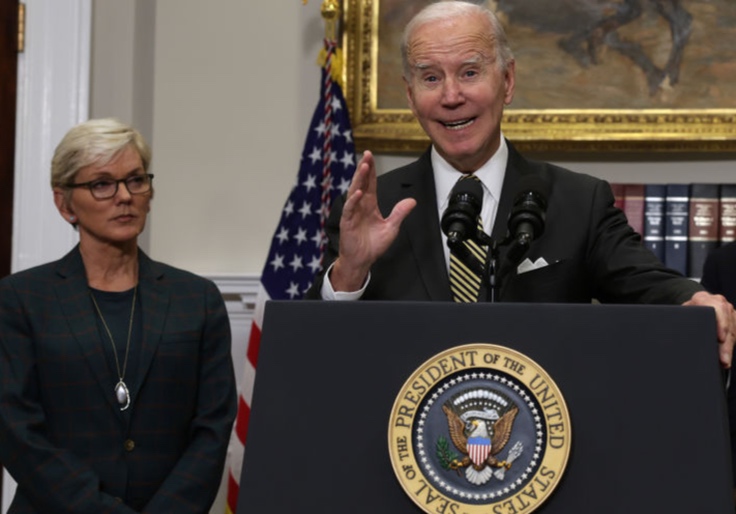Last-minute Biden regulations expected to cost consumers $450 more, one analysis shows

The Biden administration finalized climate regulations to ban most natural gas-powered instantaneous water heaters—a move that critics say will drive up costs for consumers.
The Department of Energy—which formally published the rules the day after Christmas—didn’t issue a press release announcing the action, a departure from past appliance regulations. The published rules say the regulations are expected to help the climate by curbing carbon dioxide emissions.
Overall, under the regulations, roughly 40 percent of the new tankless water heaters available in the United States today will be taken off the market by 2029. Experts and industry officials say that will force consumers to purchase either more expensive or less efficient water heater models.
One industry analysis estimates that consumers will pay $450 more on average when purchasing new water heaters thanks to the regulations. And that will impact low-income and senior households, which are most reliant on the models targeted by the Department of Energy.
The move represents the latest climate-related action taken by the Biden administration in the weeks following President-elect Donald Trump’s victory over Vice President Kamala Harris. Trump has vowed to roll back a wide swath of the climate regulations issued under President Joe Biden in an effort to boost energy production and drive economic growth.
The new regulations also highlights how the current administration has targeted home appliances to reduce carbon emissions and drive a green transition to electric products. The Department of Energy faced widespread blowback in early 2023 after it targeted popular gas-powered stoves and has continued to receive criticism for rules restricting refrigerators, furnaces, dishwashers, and clothes washers.
“It’s one more example of an appliance regulation that raises costs and reduces choices,” Ben Lieberman, a senior fellow at the Competitive Enterprise Institute, told the Washington Free Beacon. “It bans an entire category of tankless water heaters and the ones that are most affordable.”
“This is all part of the climate change agenda,” Lieberman continued. “One of the things we see is an antipathy towards natural gas versions of appliances because natural gas is a fossil fuel and they want to electrify everything. When you see bad regulations from the Biden administration, usually it has something to do with climate change.”
The rules apply to instantaneous water heaters, of which there are two types: non-condensing and condensing. But the rules hike efficiency requirements to a threshold that only condensing models can meet, effectively banning the cheaper but less efficient non-condensing models.
As a result, after the rules are fully implemented in late 2029, consumers will be forced to buy pricier models or cheaper non-instantaneous storage tank water heaters. Tank water heaters are less efficient than the models being banned by the Department of Energy.
“Our point has always been—I think that the incoming administration will understand this—why would you eliminate a higher efficiency product category? It makes no sense. It makes no sense at all,” Frank Windsor, the president of water heater manufacturer Rinnai America, told the Free Beacon in an interview. “If you really want to impact the water heating ruling, you really need to deal with the tank models.”
“As this administration is coming to the end, they have basically rushed to put this forward. But the fact of the matter is they’re making a bad choice here,” Windsor said.
Rinnai America, which is the nation’s only major manufacturer of tankless water heaters, stands to suffer from the regulations—the company recently constructed a $70 million 360,000-square-foot factory in Georgia to manufacture non-condensing gas water heaters for the American market. That facility employs hundreds of locals.
According to Windsor, the company unveiled its plans for the facility in 2020 after Trump’s efforts to boost American manufacturing. “When the rule goes into effect, all that manufacturing will basically be irrelevant,” he added. “A lot of the major equipment that we’ve invested in will basically have to be scrapped.”
The American Gas Association suggested in a statement that the regulations are illegal, noting that the Energy Policy and Conservation Act prohibits the federal government from banning a product with a distinct performance characteristic. The group noted that ongoing litigation related to the Department of Energy’s regulations targeting gas-powered residential furnaces may impact whether the water heater rules can move forward.
“DOE’s decision to ban an entire segment of instantaneous water heaters is deeply concerning and irresponsible,” said American Gas Association chief counsel Matthew Agen.












